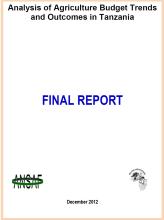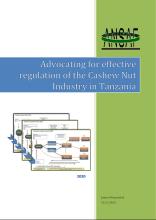Land Library
Welcome to the Land Portal Library. Explore our vast collection of open-access resources (over 74,000) including reports, journal articles, research papers, peer-reviewed publications, legal documents, videos and much more.
/ library resources
Showing items 1 through 9 of 21.In this communiqué, the undersigned Non-State Actors (civil society, pastoralist, research, private, farmers’ unions and other stakeholders) champion a call to action and outline recommendations on livestock policy advocacy strategies that take into consideration the unique conditions and opportu
The Legal Guide was created to share information on Tanzania’s system for regulating seeds and other inputs, including areas such as variety release and registration, seed certification, and trade, and to identify key decision points and challenges that could unlock further development in the see
To ensure that there is sustainability at the community level in its land rights and governance training programme, Land Rights Research and Resources Institute (HAKIARDHI), a Tanzanian national level organization that spearheads land rights of small-scale producers, uses land rights monitors (LR
The purpose of this study was to assess the bio-energy sector in Tanzania and to critically inquire the threats, benefits and opportunities to smallscale producers and sustainable environment management.
Several countries in Africa including Tanzania have committed to live to Maputo Declaration that requires AU member states to allocate 10% of national budget to agricultural sector.
Contemporary waves of large scale land acquisitions for commercial production in developing countries in Africa and other parts of the world have been branded as ‘land grabs’ by many scholars, media and activists.
The assessment of the policies, strategies, legislation, regulation and functioning of the cashew market in Tanzania is framed within the impact of the overall competitiveness of the sector.
The Study on Public Interventions in Agriculture: With What Gender Implications was conducted by ANSAF with the purpose to generate relevant data that shall facilitate better understanding on to what extent interventions in Agriculture considered the gender aspect to ensure equal participation of
This study sought to follow up the implementation of the Kilimo Kwanza initiative with the view to establish reliable facts on its significance to small-scale producers, mainly peasants and pastoralists.









